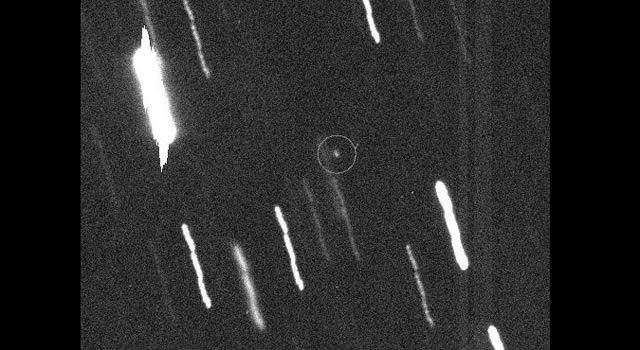NASA: Asteroid Apophis Will Not Strike Earth
NASA scientist ruled out the possibility that the asteroid Apophis will strike Earth in a flyby in 2036.
Discovered in 2004, Apophis has a diameter of about 325 m, was originally believed to be approaching Earth close enough in 2029 and 2036 to justify closer investigations on the probability for impact.
NASA, however, is now certain that Apophis will not hit Earth in 2036 and will pass our planet at a distance of no closer than 19,400 miles on April 13, 2029. The impact odds as they stand now are less than one in a million, which makes us comfortable saying we can effectively rule out an Earth impact in 2036," said Don Yeomans, manager of NASA's Near-Earth Object Program Office at JPL. "Our interest in asteroid Apophis will essentially be for its scientific interest for the foreseeable future."
In February, NASA is expecting a much closer flyby of 2012 DA14, an asteroid with a diameter of about 40 meters, at a distance of about 17,200 miles. 2012 DA14 will approach Earth again in 2046 at a distance of about 50,000 miles.
Contact Us for News Tips, Corrections and Feedback
Get Tom's Hardware's best news and in-depth reviews, straight to your inbox.

Wolfgang Gruener is an experienced professional in digital strategy and content, specializing in web strategy, content architecture, user experience, and applying AI in content operations within the insurtech industry. His previous roles include Director, Digital Strategy and Content Experience at American Eagle, Managing Editor at TG Daily, and contributing to publications like Tom's Guide and Tom's Hardware.
-
cats_Paw Grumpy cat will be dissapointed...Reply
Somehow i dont think Nasa knows about ALL of the potencial asteroids out there. -
SchizoFrog Damn... I was hoping it would be able to stop the monster that is Apple... and Justin Bieber.Reply
-
mikenygmail So this accounts for the small "window" of space as well? From what I understand, if Apophis passed through this window it would mean a certain impact in the future. Once the first pass takes place, we'll have a better idea.Reply
-
mikenygmail Cats_PawGrumpy cat will be dissapointed...Somehow i dont think Nasa knows about ALL of the potencial asteroids out there.Reply
They have admitted as much - many asteroids remain a danger, especially small ones that could strike the atmosphere like the one that supposedly caused the Tunguska event. That would be enough to take out a city. -
A Bad Day Cats_PawGrumpy cat will be dissapointed...Somehow i dont think Nasa knows about ALL of the potencial asteroids out there.Reply
Because NASA has to operate on a shoestring budget. Why fund an effective asteroid detection/counter system that might not be used 30-50 years from now when you can throw the money elsewhere?
(A nuke does not count as a counter. Contrary to Hollywood, a nuke may end up turning the asteroid into a gigantic hail of buckshot, which is worse because the hail could do more damage than the asteroid itself) -
g00fysmiley To be fair we already knwo how to deal with incoming astroids to avoid impact "This can be accomplished by irradiating the surface of an inbound rock with sufficiently intense pulses so that ablation occurs. This ablation acts as a small rocket incrementally changing the shape of the rock’s orbit around the Sun. One‐kilometer size rocks can be moved sufficiently in about a month while smaller rocks may be moved in a shorter time span. " this is part of a very interesting read , a paper by Jonathan W. Campbell Claude Phipps Larry Smalley James Reilly and Dona Bocci titled The Impact Imperative: Laser Ablation for Deflecting Asteroids, Meteoroids, and Comets from Impacting the Earth google it, a good readReply
